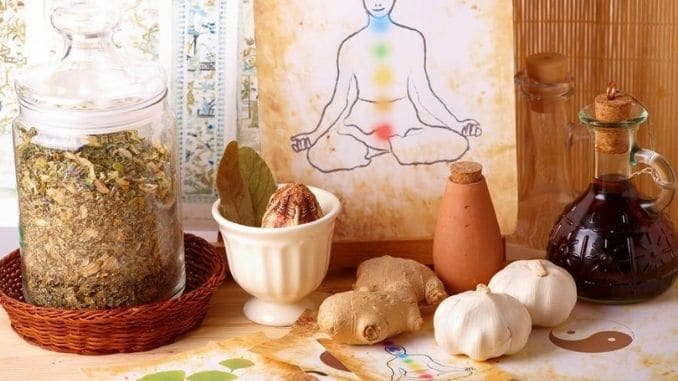
If you consistently find yourself suffering from stomach pains, bloat or uncomfortable gurgles, it might be time for a gut check. Gut health has been a hot topic of conversation in recent years. However, it’s important to have a deeper understanding of your symptoms and what might be causing them before deciding on a methodology for remedying your ailments. There are ample nonmedical options to try if avoiding medications is important to you. Some simple changes to your diet, practical exercise techniques and home remedies can work wonders to resolve your indigestion concerns.
What Is Indigestion?
Indigestion, as described by the Mayo Clinic, is a general term for discomfort felt in the upper abdomen portion of the digestive system, mostly referring to the stomach. Indigestion is typically felt in the form of one or more symptoms such as feeling uncomfortably full during or after a meal, mild to severe pain or burning feeling in the upper abdomen as well as bloat and nausea. Any combination of these symptoms can certainly be uncomfortable and concerning, however. Most cases of indigestion are not a medical concern. The main goal when dealing with indigestion is to identify the cause and find solutions that work for you and your body. If you are concerned that your symptoms are more severe and needing medical attention, do not hesitate to contact your doctor. For your average case of indigestion, let’s dive into some typical reasons why we struggle with these symptoms.
What Causes Indigestion?
The more common reasons you might be feeling the pangs of indigestion are diet and lifestyle related. Overeating or eating too quickly, consuming fatty, greasy or spicy foods and overindulging in caffeine, alcohol, chocolate or carbonated beverages are all known to cause the uncomfortable symptoms associated with indigestion. Additionally, struggles with stress and anxiety or habitually smoking can also cause issues with indigestion.
It’s important to note that underlying medical concerns related to the intestinal tract can also cause the same or similar symptoms. Conditions like gastritis, celiac disease, gallstones and pancreatitis can manifest themselves in symptoms that closely resemble a typical case of indigestion. If you have legitimate reasons to believe you are dealing with a health issue like these, seek medical attention. However, if your symptoms are mild, there’s a good chance that trying some of the following home remedies will alleviate your discomfort and likely start you on a path of good habits that prevent future encounters with indigestion.
Diet Changes to Try
The most common way to naturally reduce symptoms and occurrences of indigestion is by making some thoughtful adjustments in your diet. One important factor when considering making diet changes for this purpose is identifying potential triggers for your indigestion. A good starting place might be logging when you suffer your symptoms and what was consumed in the hours leading up to the onset. Once this is done, you can begin trying the following diet change options to see if you find some relief.
Avoid Trigger Foods
If you find yourself fighting indigestion discomfort more frequently when you enjoy certain foods, especially greasy, fatty or spicy foods, try eliminating those food choices for a few weeks. If in that time you find that you no longer suffer your symptoms, it’s safe to say you’ve found your trigger food. Chances are your trigger food is something you love like pizza, french fries or hot sauce. If eliminating one of your favorite indulgences from your diet doesn’t sit well with you, you can try some of the alternative therapies below when you know you’re going to have your trigger food.
Smaller, More Frequent Meals
In your logging, you may have taken note that your symptoms were more severe or more frequently associated with consuming larger meals. One commonly recommended diet change is switching to five or six small meals each day as opposed to three large meals each day. Doing so can help eliminate the overly full feeling associated with indigestion and give your system the chance to process your meal fully without getting overwhelmed.
Caffeine and Alcohol
Similar to avoiding trigger foods, you may be dealing with trigger beverages. Often, overconsuming caffeinated beverages like sodas and coffee or alcoholic beverages can cause the uncomfortable symptoms of indigestion. Reducing or eliminating these triggers may ease your ailments. Although most of us may see little to no caffeine consumption as a deal breaker, you may be surprised what replacing some of your beverages with water does for making you feel energetic and clear-headed.
Drink Water
Ample water consumption has been shown to have a multitude of health benefits like fatigue relief, immune boost and helping to maintain regularity. Staying well-hydrated can keep your digestive system working at its very best, which helps prevent unwanted gurgles, nausea or cramping.
Fruits and Vegetables
Another diet change that may help with regularity and reduced bloat is increasing overall consumption of fruits and vegetables. Some easy tricks for ensuring you are getting enough fruits and vegetables are to fill half of your plate with them at each meal, attempt to “eat the rainbow” each day or use fruits and veggies as your snack choices. This option has the concurrent benefit of helping prevent the consumption of the greasy trigger foods.
Lifestyle Changes
Because lifestyle choices are often to blame for frequent indigestion, it follows that some simple lifestyle changes can help resolve this malady. All of these methods are targeted at helping you lead an overall healthier lifestyle and kick out unwanted tummy troubles.
Exercise
Regular exercise helps you maintain a healthy weight and promotes optimal digestion. Extra weight on the body can put pressure on the abdomen and hinder the digestive tract from working at peak. You should always consult a doctor before beginning a new fitness program, but generally a regimen of three to five moderate workouts a week is recommended for maintaining a healthy lifestyle. Some terrific examples of exercises that can specifically help with indigestion concerns are yoga and walking.
Yoga
Yoga poses like the bridge, spinal twists, knee hugs, cat-cows and child’s pose are all superb for helping aid digestion. Try 10 to 15 minutes of your favorites each day to strengthen your core, help your intestines relax and help you achieve a more stress-free lifestyle.
Walking
Getting up and moving for part of your day can work wonders for maintaining a healthier lifestyle and keeping your digestive system in check. Try getting up and taking several 10- to 15-minute walks throughout your day or going for one 30- to 45-minute walk for your workout on any given day.
In addition to the general physical health benefits associated with exercise, you also receive perhaps the most impactful benefit of stress and anxiety relief.
Stress and Anxiety Relief
Another crucial lifestyle change for reducing the effects of indigestion is an overall reduction of stress and anxiety. Using relaxation techniques like meditation and yoga are ideal for a daily dose of calm and fewer feelings of stress. You can also try methods like deep breathing sessions, participating in enjoyable activities and getting plenty of sleep. Make sure mealtimes are as stress-free as possible. Try shutting off devices and screens when eating. Turn on music that makes you feel good or converse with your dining partner for a stress-free zone at meal time.
Stop Smoking
A simple and straightforward proven way to reduce indigestion is by ceasing smoking if you are a smoker. Although simple, quitting smoking is not always easy, so seek help when necessary to aid in your quitting smoking. There are many additional health benefits to this method.
Alternative Therapies
Even the medical field has recommended some of these home-therapy methods of treating indigestion as many have sworn by their effectiveness. Any of these can be used in conjunction with diet and lifestyle changes in whichever manner seems to work best for you.
Herbal Therapies
Herbal supplements like peppermint and caraway are recommended by the Mayo Clinic for aiding with symptoms of indigestion. Other herbal methods include the use of fennel seeds, ginger and herbal teas. Whether you choose a daily dose of these herbal treatments or “spot-treat” your symptoms as needed, finding an herbal remedy can give you peace of mind that you are using an all-natural soother for the woes of indigestion. Remember to use herbal supplements or home therapies as instructed.
STW 5 (Iberogast)
This specific herbal treatment is a liquid supplement that contains extracts of herbs including bitter candytuft, peppermint leaves, caraway and licorice root. STW 5 may work by reducing the production of gastric acid, according to the Mayo Clinic.
Acupuncture
It is possible that acupuncture treatments can work toward relieving symptoms of indigestion by blocking nerve pathways from sending pain sensations to the brain. Although it may be more advisable to work toward preventing the discomfort, chronic indigestion cases may benefit from the relief this method can bring.
Additional Options
Some methods that have abundant recommendations from average users are also worth giving a try if you like the idea of all-natural relief. Options like apple cider vinegar, baking soda and probiotics are simple methods that could help settle your symptoms. Try mixing about a tablespoon of apple cider vinegar into water and sweetening with honey or agave to make palatable. Some people have even acquired a taste for taking small sips of apple cider vinegar daily to get the natural bacteria your gut needs. For bloat relief and acid neutralization, try mixing half a teaspoon of baking soda into a glass of water. Finally, you may be interested in finding a probiotic that helps keep your gut happy and digestion regular. Many people swear by taking probiotics, and it may very well be the right choice for you.
Conclusion
There’s no wrong answer when choosing a home remedy to aid in relieving indigestion. The most common symptoms associated with indigestion are stomach ache, bloat and nausea. Because most cases of indigestion are not caused by concerns needing medical treatment, finding home therapies in the form of diet changes, lifestyle changes and alternative therapies can be extremely effective in finding relief. Find a technique or combination of several that works best for you to keep your days happier and healthier and tummy trouble-free.
For recipes that are specifically designed to keep your digestive system healthy, check out Cooking for Digestive Health, here!




